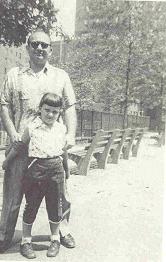
Playground 5; The author with her father
Black and White
His Graflex, Rollei, Canon, Leica
were his voice; he didn't speak,
but he recorded his poetry
on film, writing with light,
on endless rolls
of silver-coated, sprocketed curls
that he would load into his cameras
and shoot.
When the number in the little window, or on
the turning metal indicator reached twenty-four
or sometimes thirty-six,
he would rewind the film and remove it
from a trap door.
Then we would go into the closet
where it was black, and silent,
between the coats,
so quiet you could hear
the blood rushing through your ears,
except when he was loading the film
into the developing canister;
swoosh, swoosh, swoosh.
The Kodak man stayed securely
in my hand, glowing in the dark, greenish,
a plastic profile of a cartoonish man
in a 1950s hat, like a news reporter,
holding a camera, like my father's.
Maybe the Kodak man was meant to swing on a
chain to turn a red safety light on and off,
but he was mine.
In the kitchen the film was loaded, developed,
bathed and unwound.
He put the strips into the enlarger
that sat next to the broiler
and cooked up images of
the Lower East Side;
buildings, people, interaction,
then burned them with light
onto the paper,
and bathed them in a vinegary pond
in a pan in
the kitchen sink.
Up came the images, darker and clearer;
the faces, the streets, the tenements,
the sky, the people sitting near the
East River.
The family. Me.
Perserved happy moments
of light-jelly in paper jars.
The poetry of his Graflex,
calling for future stanzas to be written
by a then
Kodak Brownie.